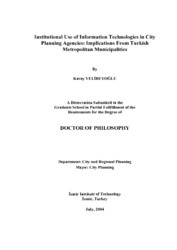Please use this identifier to cite or link to this item:
https://hdl.handle.net/11147/2918Full metadata record
| DC Field | Value | Language |
|---|---|---|
| dc.contributor.advisor | Süel, Akın | - |
| dc.contributor.author | Velibeyoğlu, Koray | - |
| dc.date.accessioned | 2014-07-22T13:48:36Z | - |
| dc.date.available | 2014-07-22T13:48:36Z | - |
| dc.date.issued | 2004 | en |
| dc.identifier.uri | http://hdl.handle.net/11147/2918 | - |
| dc.description | Thesis (Doctoral)--Izmir Institute of Technology, City and Regional Planning, Izmir, 2004 | en |
| dc.description | Includes bibliographical references (leaves: 175) | en |
| dc.description | Text in English; Abstract: Turkish and English | en |
| dc.description | xiii, 185 leaves | en |
| dc.description.abstract | This study argues the pivotal relationship between the computing technology and its organizational context. It focuses on nature of implementation in organizational settings that are becoming increasingly important. A further motivation point for this study is to reveal the different discourses (managerial/political/emotional etc.) in the cycle of implementation. The assumption behind this interest is that IT and other technologies are not value-neutral and these tools have the possibility of shaping the goals and agenda of the planning profession.As a part of methodology of the thesis, a comprehensive literature survey was completed around the theoretical issues that constitutes the framework of IT/IS adoption in organizations with a particular reference to urban planning and management. The statements and research questions were tested in the planning departments of selected metropolitan municipalities (Ankara, Izmir, and Bursa) that are experiencing information technologies and systems in various implementation stages. The research strategy was based on a variety of qualitative approaches, including two different types of closed questionnaire-based surveys and semi-structured/unstructured interviews. To measure the success/failure degree of the planning technologies used in the case study organizations in the 'user' dimension of the study, DeLone and McLean.s (1992) IS Success Model and Heeks'(1999) ITPOSMO model were used.Case study research revealed the current stands of ICT implementation in urban planning departments of local governments. It was also evaluated planning practitioner.s commitment and dependence towards computerized planning tools in working practice. In a more exploratory context, a progressive research agenda for ICT implementation in public planning agencies was developed based on the implications of empirical research and literature-based analysis. | en |
| dc.language.iso | en | en_US |
| dc.publisher | Izmir Institute of Technology | en_US |
| dc.rights | info:eu-repo/semantics/openAccess | en_US |
| dc.subject.lcc | HT166 .V43 2004 | en |
| dc.subject.lcsh | Information storage and retrieval systems--City planning | en |
| dc.subject.lcsh | City planning--Data processing | en |
| dc.title | Institutional use of information technologies in city planning agencies: implications from Turkish metropolitan municipalities | en_US |
| dc.type | Doctoral Thesis | en_US |
| dc.institutionauthor | Velibeyoğlu, Koray | - |
| dc.department | Thesis (Doctoral)--İzmir Institute of Technology, City and Regional Planning | en_US |
| dc.relation.publicationcategory | Tez | en_US |
| item.fulltext | With Fulltext | - |
| item.openairetype | Doctoral Thesis | - |
| item.cerifentitytype | Publications | - |
| item.grantfulltext | open | - |
| item.languageiso639-1 | en | - |
| item.openairecristype | http://purl.org/coar/resource_type/c_18cf | - |
| crisitem.author.dept | 02.03. Department of City and Regional Planning | - |
| Appears in Collections: | Phd Degree / Doktora | |
Files in This Item:
| File | Description | Size | Format | |
|---|---|---|---|---|
| T000491.pdf | DoctoralThesis | 1.16 MB | Adobe PDF |  View/Open |
CORE Recommender
Page view(s)
144
checked on Apr 15, 2024
Download(s)
100
checked on Apr 15, 2024
Google ScholarTM
Check
Items in GCRIS Repository are protected by copyright, with all rights reserved, unless otherwise indicated.